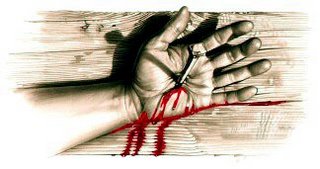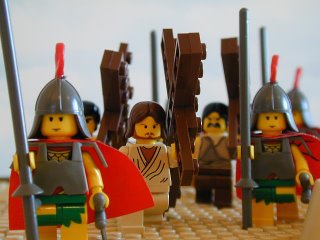Jesus arrives back in His home city, Capernaum (
Matthew 4:13). If anyone had lived in the same town for a twelvemonth he acquired citizenship and might speak of 'his own' town. This chapter shows how opposition to Jesus begins to grow. He is accused of
blasphemy, questioned about
lack of respect in the observation of fasting, and of working in the
power of the devil.
 Jesus Heals a Paralytic - Matthew 9:1-8
Jesus Heals a Paralytic - Matthew 9:1-8Thanks to his friends the paralytic has been able to come to Jesus. The man's partial or total paralysis was the reason for him to be carried as he lay on a bed. The paralytic was not alone in his faith; his friends who brought him believed Jesus could heal him too, otherwise they would not have carried him all that way just to be dissapointed about
not being healed. Thus this account teaches us about intercession: we may pray for others, not merely for ourselves. Jesus responded to his most vital need first. They most likely had heard about Jesus' healings thus far and came for physical healing, but Jesus first said
"Take heart, son; your sins are forgiven." Jesus' unique authority on earth to forgive sins sets him apart from other people, a claim that disturbed the teachers of the law, who wrongly supposed that speaking for God was their own role. The religous leaders might pronounce sins forgiven once clear atonement was made, but no atonement was made here. Which is why they said
"This fellow is blaspheming!".
Jesus sets the teachers of the law a challenge here. He askes them
"Which is easier: to say,'Your sins are forgiven,' or to say, 'Get up and walk'? Because healing as opposed to forgiveness is verifiable, the teachers of the law would probably conclude that it is easier to say
"Your sins are forgiven", as such a claim can't be disprooved while a failed healing is obviously realised.
"But so that you may know that the Son of Man has authority on earth to forgive sins...." Then he said to the paralytic, "Get up, take your mat and go home." And the man got up and went home." By performing a sign that is empirically verifiable, however, Jesus demonstrates that he is following the will of the Father and therefore has authority to forgive sins. The reasoning runs something like a traditional Jewish
qal wahomer ("how much more") argument: if God would authorize Jesus to visibly heal the effects of humanity's fallenness, would he not send him to heal that fallenness itself?
The Calling of Matthew -
Matthew 9:9-13This is a beautiful scene where Jesus is walking by a tax collector's booth, where Matthew is the tax collector, and simply says "Follow me" to which Matthew responds by simply dropping what he doing and got up and followed Christ from that day onwards. Mark and Luke call him 'Levi', which may have been his birth name, in which case Matthew would be the name Jesus gave him, as he had given Simon the name Peter. The name Matthew actually means
'God's gift'. A Tax collector, one of the lowliest professions of the time, given the chance to be an apostle of Jesus and from then on is called 'God's gift'. This scene has the Pharisees confronting Jesus again. They thought themselves righteous and thus better than the tax collectors or 'sinners' (probably thieves, prostitutes or criminals) who Jesus was dining with, questioning Jesus' own integrity if he would even associate with such people. In the eyes of these Pharisees, eating with sinners connoted approval of them; by contrast, a pious person normally preferred to eat with scholars.
Jesus responds to them by saying
"It is not the healthy who need a doctor, but the sick. But go and learn what this means: 'I desire mercy, not sacrifice.' [
Hosea 6:6]
For I have not come to call the righteous, but sinners." Here Jesus deliberatly only mentions the first half of the verse from Hosea. He does this because Hosea 6:6 ends with
"...and acknowledgment of God rather than burnt offerings." Jesus' statement goes with Hosea perfectly. No acts of the righteous person, including everything up to burnt offerings, are sufficent. no one can follow the law and make themself righteous. Jesus came to call those who view themselves as 'sinners' and as such know they need God ,rather than a code of practice, to become righteous.
Jesus Questioned About Fasting - Matthew 9:14-17For some, holiness meant avoiding eating with ungodly people. For others, practices of self-discipline like fasting demonstrated holiness. To both, Jesus undoubtedly appeared self-indulgent. John's deciples came directly to Jesus and not to His disciples, unlike the Pharisees. The Pharisees came to criticise, but the question of these disciples demonstrates much more modesty and Jesus' answer is therefore much milder. Thus Jesus responds with three illustrations about appropriateness.
- It was inappropriate for groomsmen to fast until after a wedding banquet had ended. Weddings lasted seven days, and participants (either the groomsmen or the guests) were expected to participate joyfully. Sages even interrupted their schools to hail passing bridal processions.
- New cloth had not yet shrunk, and when it began to shrink after being patched onto a garment that had finished its shrinking, the patch would tear loose from the garment, making the tear worse.
- In the same way, old wineskins had been stretched to the limit as wine fermented and expanded in them. Because old wineskins had already been stretched to the limit, if they were filled with new wine it would ultimately burst them when it expanded.
When sinners return to God through Jesus, celebration rather than fasting is appropriate.
 A Dead Girl and a Sick Woman - Matthew 9:18-26
A Dead Girl and a Sick Woman - Matthew 9:18-26Doubtless the ruler had witnessed Jesus' miracles before. Now he comes to Jesus and his high position and the many people who would see him do not stop this man of high status and authority, from kneeling at Jesus' feet. When Jesus hears his words of faith
"My daughter has just died. But come and put your hand on her, and she will live." Jesus immediately stands up and goes with him.
Along the way a woman reaches out and is healed by simply touching the hem of Jesus' cloak. Not so, Jesus said
"Take heart, daughter...your faith has healed you." And the woman was healed from that moment." This woman had been bleeding for 12 years and as such was unclean in Jewish law (probably a haemorrhage of the womb:
Lev 15:25). Because the woman was unclean she approached Jesus from behind and touched only the edge of his cloak . Perhaps she was afraid that Jesus would refuse to touch her.

Jesus then arrives in the house of the ruler where the mourning ceremony is in full swing. Even the poorest people were required to hire two flute-players and one wailing-woman. Doubtless there were many wailing-women present because an eminent family was involved. The funeral was held on the day of death because of the hot climate and because a dead body in a house made it unclean (
Num 19:11-14).
Jesus says
"The girl is not dead but asleep." signifying that he probably healed her before He arrived as with the Centurion's servant from
Matt 8:13 'Sleeping' is well-known Bible language for 'to be dead' . Jesus declares that death is like sleep, not definite. The crowd of mourners laughed Him to scorn, for they knew that the girl was dead and they did not believe that Jesus could rouse her. For this reason Jesus drives the crowd away (against the strict rules of mourning), He probably also sent them away as it would be inapproriate for mourners to be present when the father and his daughter are reunited.
Jesus Heals the Blind and Mute -
Matthew 9:27-34What should first be noticed is that the blind men know who Jesus is, they call Him the
"Son of David". A title reserved for the Messiah, the one whom the Jews expected to free them from Roman domination. This name is apparently the reason for Jesus' paying no public attention to the blind men at first. He wished to avoid giving the impression that He has come to fulfil the function of the political Messiah. They also did not ask for justification but for mercy. They did not come to make demands, but with an humble petition. Again Jesus heals them
"According to [their] faith will it be done". It is completely natural that they would tell what had happened to them with great zeal everywhere, but Jesus did not want to become known as a miracle-worker and so arouse the expectation that He would even now declare himself as the Messianic king. This is why He admonished them so strongly. The Greek word that Matthew uses here (
embrimaomai) which implies a deep feeling of indignation and anger. Jesus' anger must be linked here to the fact that the blind men had already shouted
"Son of David" after Him so noisily. That He is the Messiah must remain concealed until after the Resurrection (
Mark 9:9;
Matt 17:9). Jesus often repeated this order at the beginning of his travels, Jesus probably also wanted to aviod the comming confrontation with the Pharisees.
The healed Blind men spread the news of Jesus' miracle and a crowd gathers. In this crowd Jesus exorcises a demon which was causing a man to be dumb.
"The crowd was amazed and said, "Nothing like this has ever been seen in Israel." But the Pharisees have a very different reaction. Upon hearing the blind men effectively call Jesus the Messiah they wish to discredit Him, they could not deny Jesus' power to work miracles, but instead attacked His righteousness and connected His power with the devil.
The Workers Are Few -
Matthew 9:35-38Jesus continues His ministry of travelling an teaching and ca compassion on the harassed and helpless. Harrassed (
Eskulmenoi) here really means 'to be flayed', 'to be wounded', also 'to be plundered', in general terms 'to be weary.' While helpless (
Errimmenoi ) is really to be 'cast aside,' 'to fall to the ground as a body', generally 'weary'. This flock is so weary because of the heavy burdens laid on their shoulders by the religious leaders. Jesus sees His task to be the gathering together of the scattered and lost sheep and so subtly reveals Himself here as the promised shepherd, the Messiah. As he people of God had been referred to in the Old Testament as a flock without a shepherd (
Num 27:17,
I Kings 22:17,
Isa 53:6).
"The harvest is plentiful but the workers are few. Ask the Lord of the harvest, therefore, to send out workers into his harvest field." Here Jesus is hinting at his 'great commision' and God's plan for the future church to continue His work once He has returned to heaven.
He said to them, "Go into all the world and preach the good news to all creation. Whoever believes and is baptized will be saved, but whoever does not believe will be condemned. And these signs will accompany those who believe: In my name they will drive out demons; they will speak in new tongues; they will pick up snakes with their hands; and when they drink deadly poison, it will not hurt them at all; they will place their hands on sick people, and they will get well." (
Mark 16:15-18)


















 The false prophets come to the people “in sheep’s clothing”. What is the implication here? -- There is no way to tell the false prophet by their outer appearances! They look, smell, act, and behave like sheep. They are wolves in sheep’s clothing! Every outward appearance is that of a Christian. So “fruit” cannot mean their conduct! Fruit is the doctrine that they preach; the fruit is the message that they bring. If they preach anything but eternal salvation by grace through simple faith in Jesus Christ, they are false prophets. If they bring a message that is contrary to what Jesus taught then they are false prophets.
The false prophets come to the people “in sheep’s clothing”. What is the implication here? -- There is no way to tell the false prophet by their outer appearances! They look, smell, act, and behave like sheep. They are wolves in sheep’s clothing! Every outward appearance is that of a Christian. So “fruit” cannot mean their conduct! Fruit is the doctrine that they preach; the fruit is the message that they bring. If they preach anything but eternal salvation by grace through simple faith in Jesus Christ, they are false prophets. If they bring a message that is contrary to what Jesus taught then they are false prophets.

